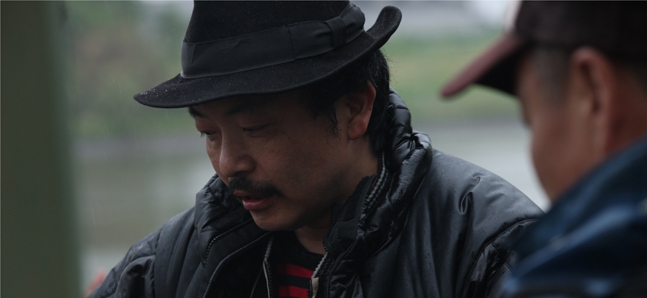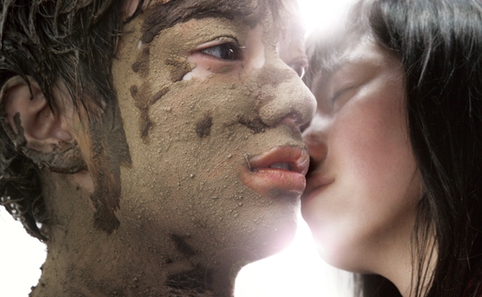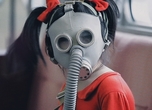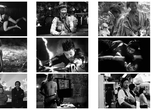Sion Sono: The interview
The provocative filmmaker talks about his post-March 11 film, ‘Himizu’

Posted: Wed Jan 11 2012
Sion Sono was already preparing to shoot his latest picture when the March 11 quake hit last year, so he did the obvious thing: he wrote it into the movie. The 51-year-old director describes Himizu as a simple coming-of-age film, but that takes on a whole different meaning when you're dealing with the cinematic provocateur who gave us Strange Circus (incest! murder!), Suicide Club (mass suicide!) and Love Exposure (religious cults! upskirt photography!). Based on a manga by Minoru Furuya, the film focuses on a junior high-schooler whose desire for a normal life is flummoxed by a violent father, flaky mother and persistent loan sharks, pushing him to desperate, violent ends. Plenty to work with already, you'd think, but Sono adds a whole new level of human misery by relocating the action to post-tsunami Ishinomaki, where he and his crew shot the film on location last May. Himizu drew a mixed response when it screened at Venice International Film Festival in September ('We hated the experience of watching the vast majority of Himizu. Hated it,' admitted The Playlist, in what turned out to be a cautiously positive review), but that didn't stop it getting an eight-minute standing ovation, or young stars Shota Sometani and Fumi Nikaido from scooping the Marcello Mastrolianni Award for best new actors. Here, Sono talks to Time Out about how he responded to the Tohoku earthquake and tsunami, and why he's actually a fanboy for Jesus.–James Hadfield
This is your first foray into the world of film adaptations. What made you pick Himizu?
I can't describe it all that well. I've always been someone who made films based on original stories, and when I wondered about what source to use for my first film adaptation, it felt like the only option. My colleagues brought me lots of other books, but in the end I decided to film the one that I really liked myself.
How did the script change as a result of March 11?
The biggest change was that we moved the production to one of the areas hit by the disaster – we actually started filming in May 2011. Himizu is a coming-of-age story about young people living in real-life Japan, but the original was written over a decade ago. I felt that if I was going to set it in the present day and preserve that realness at the same time, I'd have to film the aftermath of the disaster. There was no option but to have it there in the background. We shot it in Ishinomaki, and when I went back there as a volunteer recently, all of the rubble had been cleared away: it was a completely different environment to the one we filmed in last May. People tried to dissuade me from going to film there at the time, but I'm glad that we have some kind of record now.
Were you changed personally by the disaster?
It changed me, yes. Up until that point, I'd been able to live my life without paying attention to [social issues], but this was different. This was a problem that affected me personally, and I thought I mustn't ignore that as an artist. Some people described Japan after the '90s as being a never-ending normality, but I think that's over: now we're in the never-ending un-normality.
So do you think there are people who weren't affected?
Right. Pretending that something didn't happen is a Japanese national trait. Personally, I couldn't do that. I think that this tendency is particularly strong in men – they don't want to change. Women, however, slowly move on.

Shota Sometani and Fumi Nikaido in Himizu. © 2011 Himizu Film Partners
You've said before that you don't go to the cinema to be encouraged, but there's a theme of 'don't give up' running through this film. Do you think that's another change?
Barely. I always say that I've been defeated by hope. I still don't feel that I want to be encouraged at the cinema – I don't feel that at all! (Laughs) I wrestled with this during filming, too. The fate of the main character is different from in the original, but I didn't feel there was any other option: that was the only way to do that final scene.
How did you want to portray the teenagers in the film?
I just wanted them to be like the sun. People think of me as a schlock merchant, but I used to be a guy who made straightforward coming-of-age films. This is me returning to my roots.
When you look at the whole film, it's like you're entrusting your hopes to the children.
Yes, I think that's it. I think junior high schoolers are great. And I wanted to make a modern-day coming-of-age tale.
Unlike some of your other films, there wasn't any mention of Christianity this time, but it felt like you were questioning the nature of salvation...
I'm just a member of the Jesus fan club. I'm not Christian, but… er, maybe fan club is overstating it actually. But, yeah, I think Christ's life as a human being is interesting, and I'd like to make a film about it at some point. I wanted to become a Christian for a long time, but there was part of me that didn't accept it, so I gave up in the end. There was a time when I was really obsessed with the issue of God, you know.
Do you have a strong sense of wanting to save people?
I can't even save myself, let alone other people. It's not like that. Sometimes I'll feel the hopelessness or fear of not being able to save other people, but… Wondering why you can't save people and wanting to save people are part of the same thing, I guess.
It sounds like Himizu had a pretty intense reception at Venice Film Festival.
I try not to listen to any of the feedback for each of my films – I close my ears to it – so I'm honestly not sure exactly what response it had. I don't want to be swayed by that: I'm always thinking, "I just make the films I want to make. Shut up!"
Himizu is release nationwide on January 14
Tweets
- About Us |
- Work for Time Out |
- Send us info |
- Advertising |
- Mobile edition |
- Terms & Conditions |
- Privacy policy |
- Contact Us
Copyright © 2014 Time Out Tokyo














Add your comment